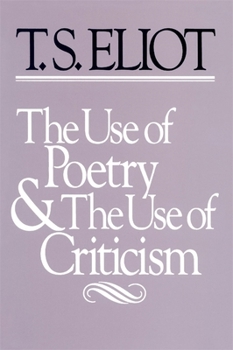The Use of Poetry and the Use of Criticism: Studies in the Relation of Criticism to Poetry in England
(Part of the The Charles Eliot Norton Lectures Series)
Select Format
Select Condition 
Book Overview
The elder statesman of literary modernism traces the reciprocal relationship between poet and critic.
No individual did more to shape the trajectory of twentieth-century criticism than T. S. Eliot. A self-described "classicist," his repudiation of the Romantic era's emphasis on subjectivity and self-expression in favor of a rigorous analytical focus on literary tradition influenced critics for generations to come. Yet Eliot was not entirely comfortable with his place in the canon. "Tradition and the Individual Talent," the universally anthologized 1919 essay that laid out his views in their most programmatic form, was, in his own estimation, "the most juvenile" of his critical writings. He believed that the 1932-1933 Norton Lectures collected here, in contrast, reflected his mature thought. In place of the sweeping pronouncements of his earlier work, these lectures offer a shrewd and sensitive account of criticism as a product of history. Beginning with the development of the field in the age of John Dryden, when critics turned poetry into the province of an intellectual aristocracy, Eliot explores how a long line of English poet-critics responded to the unique demands of their time. Johnson, Wordsworth, Coleridge, Shelley, Keats, Arnold, and Richards each mined the past to offer a fresh answer to the question, "what is poetry?" And Eliot brilliantly shows how the poetic strengths--and shortcomings--of each were intimately connected to their critical work. Trenchant and authoritative, The Use of Poetry and the Use of Criticism reveals that Eliot himself is no exception to this rule. His deep erudition, his existential doubts, and his yearning for order animate these lectures as much as his best poems.Format:Paperback
Language:English
ISBN:0674931505
ISBN13:9780674931503
Release Date:July 1986
Publisher:Belknap Press
Length:160 Pages
Weight:0.51 lbs.
Dimensions:0.5" x 5.4" x 8.3"
Customer Reviews
1 rating
An Insightful Work On Poetry
Published by Thriftbooks.com User , 25 years ago
Most of us are afraid of poems because as we read it, we can't seem to make head or tails as to what we have read. Therefore, for those of us who have "poem-phobia," I recommend this delightful little work.In this work, Eliot ask the question of what is poetry and the use of criticism in poetry as well as the relationship between the former and the latter. Eliot proposes to start the enquiry by reviewing the history of criticism starting from Elizabethan era untill that of his time. Through the course of the exploration, I was enthralled by Eliot's insightful opinion of critics and their opinion as to what is poetry and its uses. I was particularly drawn to the final chapter of his work which does not offer any final word to the questions which he posed but rather giving us advice as to how to read poems (in particular the modern poets, i.e., 20th century). I was very glad to have read this work because it sure beats reading a heavy college text on how to read poetry.





